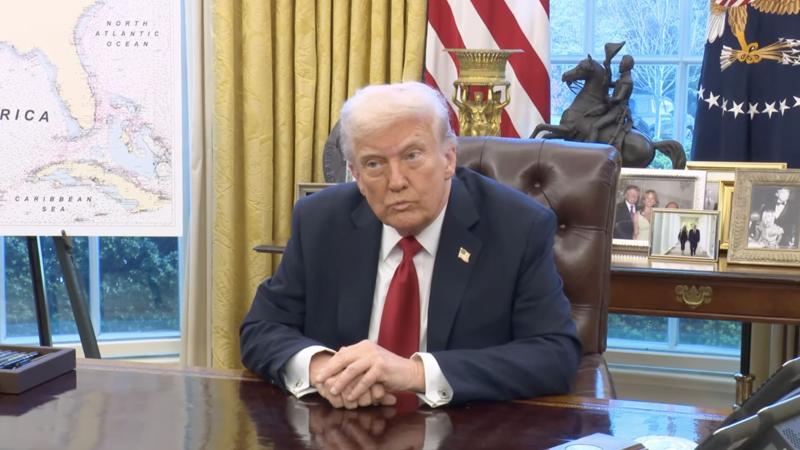President Donald Trump has declared “Liberation Day” in America ahead of plans to announce reciprocal tariffs this afternoon.
All three major U.S. markets were in the green by noon Wednesday, but trading will end before Trump makes his big announcement in the Rose Garden.
It a post on Truth Social, Trump wrote: “IT’S LIBERATION DAY IN AMERICA!”
But the president has provided little clarity about his worldwide tariff plans. The Washington Post reported Trump plans to implement a broad 20% tariff on most imports.
Trump also lashed out at Republican critics of his plan.
“Mitch McConnell of Kentucky, Susan Collins of Maine, Lisa Murkowski of Alaska, and Rand Paul, also of Kentucky, will hopefully get on the Republican bandwagon, for a change, and fight the Democrats wild and flagrant push to not penalize Canada for the sale, into our Country, of large amounts of Fentanyl, by Tariffing the value of this horrible and deadly drug in order to make it more costly to distribute and buy,” Trump wrote on Truth Social. “They are playing with the lives of the American people, and right into the hands of the Radical Left Democrats and Drug Cartels.”
Democrats have proposed a resolution to bar Trump’s emergency declaration to impose tariffs on Canada.
U.S. Sen. Rand Paul, R-Ky., said the nation’s free trade policies have helped make America a superpower.
“International trade since World War II has made us phenomenally rich. President Trump paints it another way,” Paul said during a radio interview on Sunday. “He says, ‘We’ve been taken advantage of.’ But I really strongly disagree because trade has made us so rich and really has made the world a better place. The more we trade … the less we fight.”
Senate Democratic Leader Chuck Schumer, D-N.Y., called tariffs a tax on families. Schumer said the average American family would face an additional an annual cost of $5,000.
“It’s creating huge problems,” he said, promise a vote “soon” on a measure to stop Trump’s emergency declaration.
Trump said Paul and other Republicans could join Democrats on what Trump dubbed a “ploy.”
“The Senate Bill is just a ploy of the Dems to show and expose the weakness of certain Republicans, namely these four, in that it is not going anywhere because the House will never approve it and I, as your President, will never sign it,” Trump wrote. “Why are they allowing Fentanyl to pour into our Country unchecked, and without penalty. What is wrong with them, other than suffering from Trump Derangement Syndrome, commonly known as TDS? Who can want this to happen to our beautiful families, and why? To the people of the Great States of Kentucky, Alaska, and Maine, please contact these Senators and get them to FINALLY adhere to Republican Values and Ideals.”
Last week, Trump announced a 25% tariff on imported automobiles, duties that he said would be “permanent.” The White House said it expects the auto tariffs on cars and light-duty trucks will generate up to $100 billion in federal revenue.
Trump said that he hopes to bring in $600 billion to $1 trillion in tariff revenue in the next year or two. Trump also said the tariffs would lead to a manufacturing boom in the U.S., with auto companies building new plants, expanding existing plants and adding jobs.
Trump predicts his protectionist trade policies will create jobs, make the nation rich and help reduce trade deficits and the federal government’s persistent deficits.
The “Liberation Day” tariffs follow months of discussion since Trump took office in January. On the campaign trail, Trump frequently called “tariff” the most beautiful word in English.
Some economists have predicted Trump’s tariffs could mean higher prices for U.S. consumers. The Budget Lab at Yale modeled a broad 20% but noted, “It is highly uncertain whether this is the policy that will be announced April 2.” The model suggests that prices would by 2.1% to 2.6% in the short run, the equivalent of an average per household consumer cost of $3,400 to 4,200 in 2024 dollars.
Business groups, including the U.S. Chamber of Commerce and American Farm Bureau Federation, have urged Trump to back off tariff threats.
Trump has promised that his tariffs would shift the tax burden away from Americans and onto foreign countries, but tariffs are generally paid by the people who import the foreign products. Those importers then have a choice: Absorb the loss or pass it on to consumers through higher prices. The president also promised tariffs would make America “rich as hell.”







